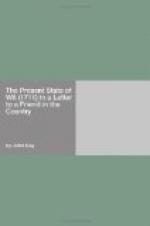understand, and at those
English Authors, whose
Excellencies he cannot reach; with him
Voiture
is flat and dull,
Corneille a stranger to the
Passions,
Racine, Starch’d and Affected,
Moliere, Jejune,
la Fontaine a poor
Teller of Tales; and even the Divine
Boileau,
little better than a Plagiary. As for the
English
Poets, he treats almost with the same Freedom;
Shakespear
with him has neither Language nor Manners;
Ben.
Johnson is a Pedant;
Dryden little more
than a tolerable Versifier;
Congreve a laborious
Writer;
Garth, an indifferent imitator of
Boileau.
He traduces
Oldham, for want of Breeding and
good Manners, without a grain of either, and steals
his own Wit to bespatter him with; but like an ill
Chymist, he lets the
Spirit fly off in the
drawing over and retains only the
Phlegm.
He Censures
Cowley for too much Wit, and corrects
him with none. He is a great Admirer of the incomparable
Milton, but while he fondly endeavours to imitate
his
Sublime, he is blown up with
Bombast
and
puffy Expressions. He is a great stickler
for
Euripides,
Sophocles,
Horace,
Virgil,
Ovid, and the rest of the Ancients;
but his ill and lame Translations of ’em, ridicule
those he would commend. He ventures to write
for the Play-Houses, but having his stol’n,
ill-patch’d fustian Plays Damn’d upon the
Stage, he ransacks
Bossu,
Rapin, and
Dacier, to arraign the ill-taste of the Town.
To compleat himself in the Formalities of
Parnassus,
he falls in Love, and tells his Mistress in a very
pathetick Letter, he is oblig’d to her bright
Beauty for his Poetry; but if this Damsel prove
no more indulgent than his Muse, his Amour is like
to conclude but unluckily.”
Demetrius before the Curse of Poetry had seiz’d
him, was in a pretty way of Thriving Business,
but having lately sold his Chambers in one of the
Inns of Court, and taken a Lodging near the Play-house,
is now in a fair way of Starving. This
Gentleman is frequently possest with Poetick Raptures;
and all the Family complains, that he disturbs ’em
at Midnight, by reciting some incomparable sublime
Fustian of his own Composing. When he is in Bed,
one wou’d imagine he might be quiet for that
Night, but ’tis quite otherwise with him; for
when a new Thought, as he calls it, comes into his
Head, up he gets, sets it down in Writing, and so
gradually encreases the detested Bulk of his Poetick
Fooleries, which, Heaven avert it! he threatens to
Print. Demetrius having had the misfortune
of miscarrying upon the Stage, endeavours to preserve
his unlawful Title to Wit, by bringing all the Dramatick
Poets down to his own Level. And wanting Spirit
to set up for a Critick, turns Spy and Informer
of Parnassus. He frequents Apollo’s
Court at Will’s, and picks up the freshest
Intelligence, what Plays are upon the Stocks, what
ready to be Launch’d; and if he can be inform’d,
from the Establish’d Wits, of any remarkable
Fault in the new Play upon the Bills, he is indefatigably
industrious in whispering it about, to bespeak its
Damnation before its Representation.




